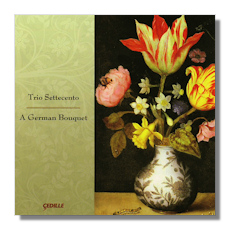
The Internet's Premier Classical Music Source
Related Links
-
Buxtehude Reviews
Muffat Reviews
Schmelzer Reviews
Krieger Reviews
J.S. Bach Reviews - Latest Reviews
- More Reviews
-
By Composer
-
Collections
DVD & Blu-ray
Books
Concert Reviews
Articles/Interviews
Software
Audio
Search Amazon
Recommended Links
Site News
 CD Review
CD Review
A German Bouquet

- Johann Sebastian Bach:
- Fugue for Violin & Harpsichord in G minor, BWV 1026
- Sonata for Violin & Basso Continuo in E minor, BWV 1023
- Dietrich Buxtehude: Sonata for Violin, Viola da Gamba & Harpsichord in D minor, Op. 1 #5 (BuxWV 256)
- Georg Muffat: Sonata for Violin & Continuo in D Major
- Johann Georg Pisendel: Sonata for Violin & Continuo in D Major
- Johann Heinrich Schmelzer: Sonata in D minor
- Johann Philipp Krieger: Sonata for Violin, Viola da Gamba & Continuo in D minor, Op. 2 #2
- Johann Schop: Nobleman
- Philipp Heinrich Erlebach: Sonata for Violin, Viola da Gamba & Continuo in A Major #3
Trio Settecento
Cedille Records CDR90000114
Trio Settecento formed in 1997. The first releases of Rachel Barton Pine (violin), John Mark Rozendaal (viola da gamba and cello) and David Schrader (harpsichord, positiv organ) concentrated on the Italian 18th century repertoire. In extending their compass to French and German music of the period and ever conscious of the need for authenticity melded with spirit, the players explored the sound palettes afforded by the viola da gamba as well as and instead of cello; and positiv organ beside harpsichord. Add to such meticulous and imaginative playing an equally inspired choice of composer and work. This almost inevitably leads to a CD that it's extremely easy to like very much indeed.
A German Bouquet contains a choice of repertoire that emphasizes the more intimate achievements of the High Baroque. Such music has few or no pretensions; breast-beating is totally alien to it. In particular, it's music which allows something of an insight into the essence of composers and music-makers alive in those states which now make up Germany. Specifically those working in Hamburg, Leipzig, Lübeck, Rudolstadt, Vienna and Weissenfels. The composers were born in 1620 at the earliest and died in 1755 at the latest.
Influences from outside the German states are also several: that of English musicians such as Brade on Johann Schop, whose Nobleman opens the nearly 80 minutes of music-making on the CD. The influence of Italian styles on Schmelzer, Muffat and Krieger. And of prevailing French tastes on Erlebach. Pisendel has the distinction of an amazing virtuosity on the violin. He too visited Italy; the influence of Vivaldi can be heard in his Sonata for Violin and Basso Continuo in D Major [tr.s 19-21]. When you add to that sonatas (and a fugue [tr.12]) by the two giants, Bach and Buxtehude, the variety and range of music on this CD is striking. But it's not all about influence and stylistic continuity (and development): the music is presented for its own innate virtues and values – of which there are many.
The intensity of playing by the members of Trio Settecento (Rachel Barton Pine, violin; John Mark Rozendaal, viola da gamba & cello; David Schrader, harpsichord & positiv organ) both collectively and individually presents if not a "unified" view of this music, certainly a consistent one. Beauty and great expressiveness are common to all the works here. The playing also sponsors great intimacy. It does this by emphasizing an opulent, rich and full sound. The listener then (perhaps even unconsciously) associates such forwardness and assuredness with the kind of domestic communication for which much of the music here was written.
The other characteristic of the playing of Trio Settecento is warmth. A gentle, close and almost "protective" spirit pervades and informs their sound, and sense of structure and development – where the music is leading. Then, quite remarkably and without fuss or self-consciousness, they bring the listener with them. But not as a teacher leads a pupil. Much more in the way in which music-makers of eighteenth century Germany must have ensconced themselves with their small and unpretentious (yet perhaps righteously expectant) patrons, employers, and listeners.
The result is truly as if one is part of a lively, purposeful and somewhat special occasion, the significance of which (such is the Baroque German mind and soul) is not bruited. Just clearly appreciated. The pace and alternation of composers and the lengths of their works are effective. There is little of miscellany here; more of an illustrative construction, well thought-out and excellently executed.
With the CD comes a nicely-produced and informative booklet containing introductory essays, notes about the works, performers, instruments and tuning (originals as well as modern reproductions; an unequal temperament based on Werckmeister III, by David Schrader). As a way both to dip your toe in these very warm and healthful waters if such music is new to you; and/or as a highly stimulating chance to explore some less well-known of its corners this CD can hardly fail to please. Recommended.
Copyright © 2010, Mark Sealey.




















